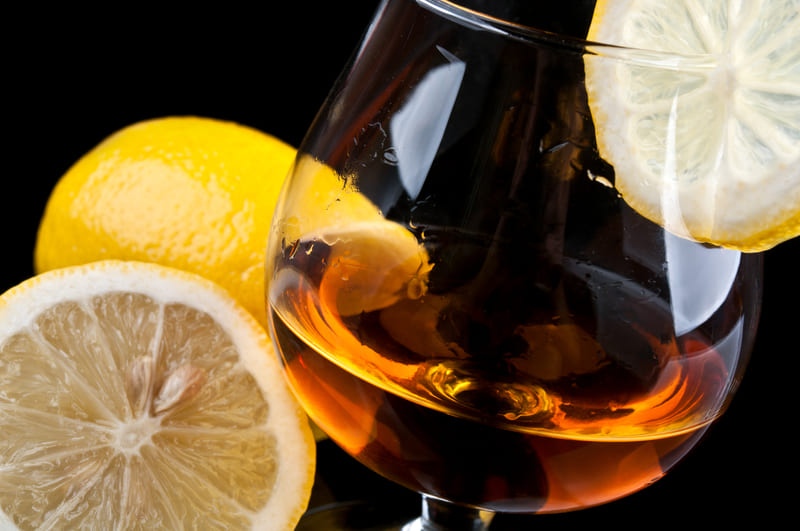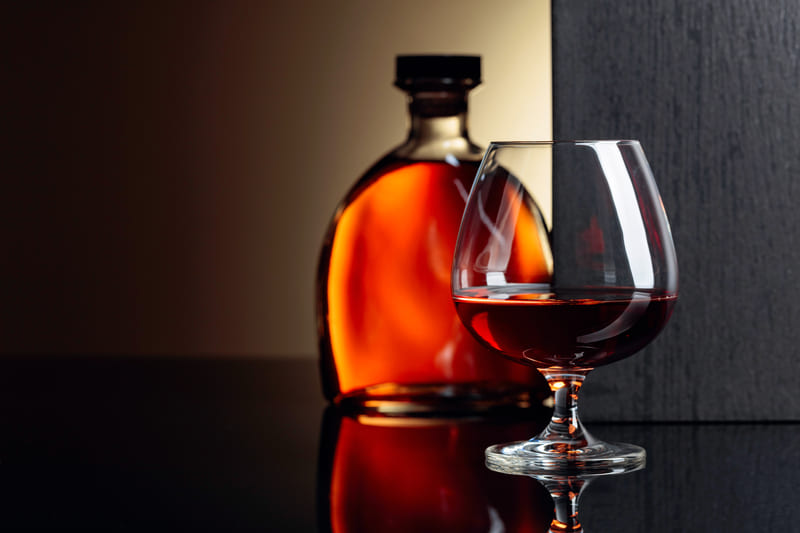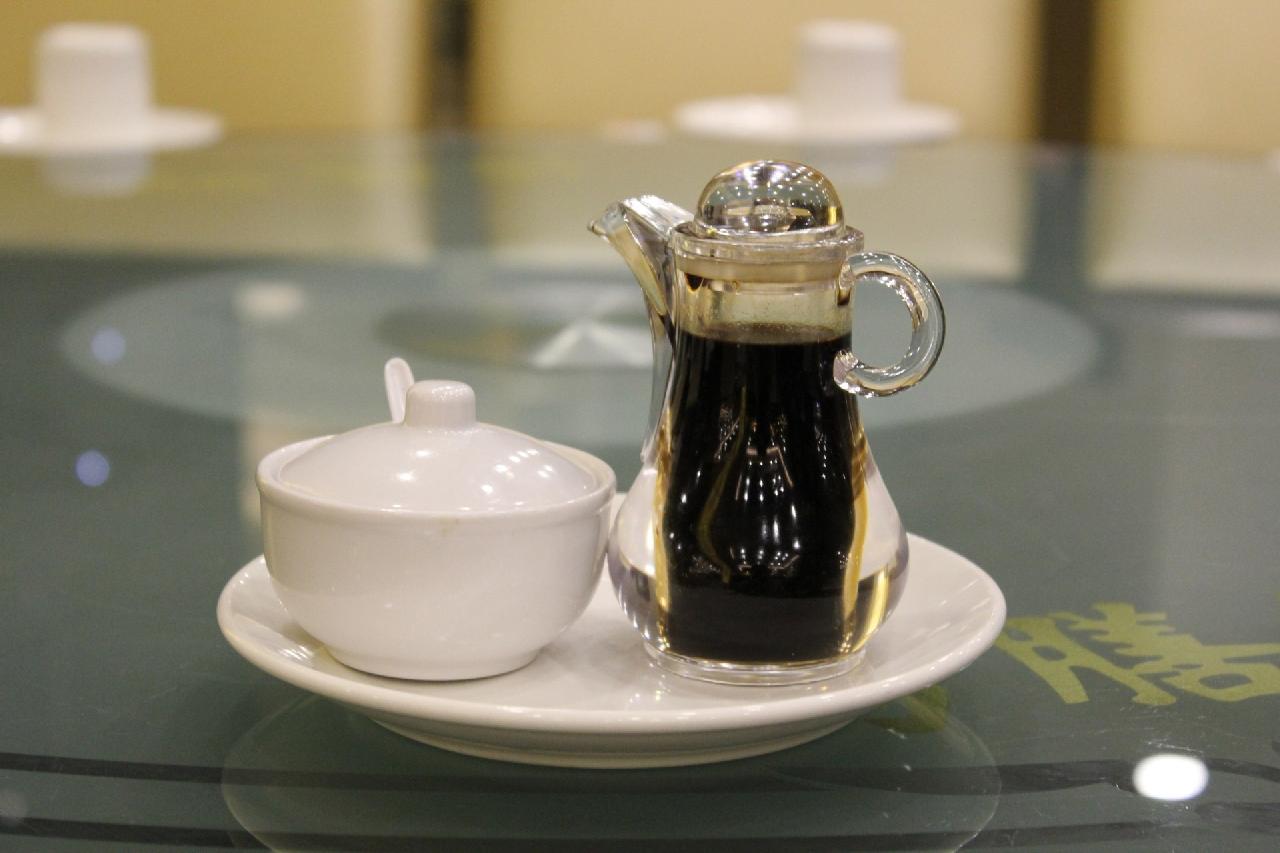The French version of Brandy, Cognac, is a type of alcohol that originates from the region of the same name. This beverage falls under France’s appellation d’origine contrôlée (AOC), with its production required to meet certain production methods. It also spends a lot of time in the barrel for the drink to age like whiskey and wine.
Continue reading this article to find out the best ways to use these alternatives in your cooking.
Best Cognac Substitutes
Cognac has a rich, aged flavor – one that tastes like a lot of other things, but the primary flavor mainly depends on the maker’s preference. In general, the taste of Cognac can vary from dried fruits and nuts, and spices to chocolate, coffee, and even cigars!
This drink can be used to bring out the best flavors in meat recipes as it enriches the sauce and makes dishes a blend of sweet and savory. It can also go with desserts that include chocolate. However, not always will one have a bottle of Cognac around, so we have compiled a list of the best alternatives for the beverage.
1. Brandy
Since Cognac is just another version of Brandy, it automatically makes the latter the best substitute for Cognac. Taste experts or those who are used to fine dining might be able to tell the difference, but if you are using Brandy as an alternative in cooking or mixing cocktails, no one might be able to notice.
Brandy, also known as ‘burnt wine, would be the best if you are deglazing or flambeing something – especially cocktails, steak and beef dishes. It gives the dish a bittersweet but fruity flavor which is excellent for gourmet dishes. It also works well for sauces, desserts, and salads, making it a very flexible ingredient to work with.
The only perceptible difference between the two drinks is the fact that one is more expensive than the other. Any Brandy would work, but you would want to avoid Pisco (Peruvian Brandy) as it tastes completely different and has a sour flavor.
2. Sherry
Sherry is a sweet, rich, and fruity alcoholic beverage that originates from Spain and makes a perfect substitute for Cognac in sauces and glazings. It has a unique flavor profile – one that starts off as a sweet and fruity experience and then ends with a warm and spicy sensation on your tastebuds.
This drink also has a lower alcohol percentage than Cognac – about 20%, so if you are substituting Sherry for Cognac, make sure you choose a brand that is older for a richer taste. Also, try to avoid products that have been labeled as ‘cream Sherry’ as it is also much sweeter than Cognac.
In cocktails, the good dosage to use is 2:1 wherein you have to add twice as much Sherry to compensate for the taste of Cognac. In cooking recipes (especially mushroom, which is heaven paired with Sherry), a good ratio to use the beverage is 1:1.
3. Cooking Wine
Cooking wine is another great substitute for Cognac due to its fruity, stewed flavor. Its taste can only be defined by the fact that it is similar to what wine would be like if it were cooked – baked, burnt with a hint of caramel-like sweetness.
This might not be the same taste as what Cognac is like, and has a less hard flavor, but when added to a recipe, it would give the dish the same flavor that Cognac would have helped it achieve.
Although the average alcohol content of cooking wine is more than its regular variant (around 16% ABV) will generally vanish after some time of cooking; this works well with gravy, desserts, sauces, or deglazing sweet dishes.
The stewed taste of Cooking Wine can be balanced out by adding a few drops of fruit juice, but if your brand of wine is already sweet enough, then no need for it.
4. Armagnac
Armagnac is very similar to Cognac in its origin – both are distilled from grapes (although the former is distilled only once) and come from regions in France. Since both beverages are made from the same base ingredient, it makes an easy replacement for Cognac, but its taste profile is much drier and less fruity.
Hence, Armagnac can only be used as a culinary substitute and is best for making marinade, gravy, enhancing pastry flavor, or spicing up a sauce. It also makes for a healthy alternative, as Armagnac can lower blood sugar levels for 24 hours or lower the risk of diabetes by 30% when consumed 3-4 times weekly.
Although Armagnac may have a drier flavor, it is more overpowering than Brandy and in cocktails, should be used in the following proportion – for every 30 ml of Cognac, use 20 ml of Brandy. As for using the beverage in dishes, you can go with the ratio of 1:1.
5. Whiskey
Whiskey makes for a good substitute for Cognac as both of them have the same flavor profile.
Due to its smoky, briny, and malty taste, it is not the best alternative when used in cooking sweet dishes. However, it can enhance the flavor of spicy dishes or plates of seafood and bring out the best in them – even giving you extra protein.
In case you only have whiskey to use for sweet dishes, try and use a lesser amount according to taste. When mixing in drinks, and cocktails, you might want to add an ice cube to distill the strong texture.
6. Bourbon
Bourbon is another variant of whiskey with a toasty, malty flavor to it. Since it is made of corn or rye mixed with 40% – 80% alcohol, the base ingredients of the beverage are not the same as Cognac, so the taste you might get from substituting it will not be the same.
However, it works well when you need it to replace the smell or the looks of Cognac-cooked dishes. It has strong hints of oak, vanilla, and caramel and works well in sauces or when used to glaze meat dishes like fish, chicken, and meat. It is also heart-friendly and helps cholesterol from building in the arteries.
Bourbon should be substituted in the ratio of 1:1 and then be topped off with some fruit juice (around 2 teaspoons) to bring out the flavor you want from Cognac. For cocktails, Bourbon works best in replacing Cognac in a Sidecar or Sazerac.
Just like Brandy, it is best if you buy unflavoured Bourbon, but if going for dishes that will be sweet or savory, vanilla Bourbon will be the best option.
7. Scotch Whiskey
Scotch Whiskey goes by its name due to the fact that it is the rich, original and traditional whiskey made from the birthplace of the beverage itself – Scotland. Due to its sharp, spicy taste, it makes for a good substitute for the flavor of Cognac in spicy dishes or cooked with seafood items and cheese.
It also has low levels of sodium and zero fat, making it a great alternative to add to your savory and gravy dishes. The only downside of Scotch Whiskey is that it can be more expensive compared to Cognac and is not a substitute that you can easily obtain – especially for those on a budget.
8. Rum
Rum may be a very strong drink, much harder than Cognac, but it has its unique flavor profile. The beverage can range from being sweet to dry, but when mixed in cooking, it will give off a sweet flavoring with a grassy tinge. This makes it a great substitute for Cognac in desserts, and meaty, stewed dishes like beef and pork.
Like most alcoholic beverages, Rum can also work well with seafood and poultry recipes. However, you will have to be careful as its sweetness can outdo and overpower certain flavors. So, remember to add at least 15ml of any kind of fruit juice when making a cocktail with Rum.
In cooked dishes, the ratio of 1:1 is alright, but if the taste is getting overpowered by the flavor of Rum, then do not hesitate to add some fruit juice to the portion to bring down the oaky flavor. If you are using dark rum, which is more flavorful, remember to use only ⅓ of how much Cognac is asked of, in the recipe.
9. Wine
This is the cheapest and most easily available alcoholic replacement for Cognac, as both red and white wine works well for the purpose. White wine is obviously better as an option due to its same base ingredient – white grape juice, which has a similar sweet and fruity taste as Cognac.
White wine works best in gravies and sauces for pasta, mashed potatoes, French onion soups, chicken and veggie broth recipes, or with just chicken and vegetables. As for red wine, which has a more bitter taste, the effect of Cognac can be by mixing some sort of fruit juice – especially citrus.
Red wine is usually used by chefs to marinate or neutralize the flavors in the meat when there are too many strong flavors like garlic. It also helps soften the meat and absorb all the flavors of the herbs and spices added to the recipe. The bittersweet flavor also tastes great in sweet dishes like truffles and dried cherries.
Try to use a medium to full-bodied wine so that the bitterness of it does not take over your dish’s taste, except in the case of Port Wine. Wine also makes for a healthy substitute as it contributes to the growth of good guttural bacteria.
10. Coffee Liqueur
If it is not clear by its name already, Coffee Liqueur is a combination of the two most popular drinks in the world – coffee and alcohol. Although Cognac and Coffee Liqueur are very different from each other, both are dark spirits with complex flavors.
As one can expect from coffee-based alcohol, Coffee Liqueur works best with dessert recipes where sweetness is required – especially if it calls for the coffee itself! The hardy taste of alcohol mixed with coffee perfectly replicates the balance of sweetness and hardiness that Cognac has.
Tiramisu is one such dessert where coffee liqueur would work really well in place of Cognac as the coffee notes are absolutely excellent and the Cognac would not be missed at all!
You might even want to replace Cognac with Coffee Liqueur as your new favorite alcohol for usage in dessert recipes.
11. Calvados
Calvados is another French Brandy, quite similar to Cognac, that is produced in the Normandy region. It is normally made using apples or pears which makes it have a well-balanced flavor with a slight tinge of pleasing apple or pear undertones.
If you are using Calvados in place of Cognac in cooked dishes and recipes, a good ratio to use is 1:1. Due to its unique characteristic of having an apple flavor, Calvados should be substituted in drinks with every 30 ml of cognac being replaced by 20 ml of Calvados, to keep the sweet taste in check.
This French brandy can also be used when you serve pancakes and or try making a dish by flambe-ing it. Calvados works nicely with beef or chicken in a savory dish with a good gravy, as it has the ability to enhance all kinds of umami flavors.
Cognac may be an alcoholic drink, but it does not mean that it cannot have its non-alcoholic substitutes. Cooking for a household that cannot serve alcohol in dishes due to patients or children can get tricky – especially when you want to make fancy flambeed and roasted items.
Although Cognac can be replaced with most citrus fruits, we have put together some of the best alternatives that can be used for the same.
12. Fruit Juice
A great, non-alcoholic substitute for Cognac, is using fruit juice to replace the hard drink. Citrus fruits work the best, as the finishing of the dish will have the same, balanced flavor as what Cognac will bring, so white grape juice or orange juice will be the best. If no orange juice is available, then orange essence works too.
Other fruit juices that can bring out the same flavor and are more readily available to test are apple, apricot, or peach juice.
Fruit juices work best as a Cognac substitute in sweet recipes like desserts, but using it in gravies and sauces can also bring out the savory flavor that people are fond of. If you need to add a little more acidity to your dishes, you can pour in some cooking wine, apple cider vinegar, or lemon juice.
13. Soy Sauce
This might sound like a peculiar choice for a Cognac alternative, soy sauce can actually be used in place of the alcoholic beverage in some recipes. It can also be effective despite their flavor profiles not matching.
Keep in mind that it has a saltier flavor than Cognac, so if you want to make something more sweet or savory, you might want to add some fruit juice to balance the mixture.
Additionally, you will not need as much soy sauce as you would cognac, which is great as you can get your work done even with a small amount. All you need to do is use the amount you would in a dash – just a bit of the sauce.
As you may not want your soy sauce drizzling into your dessert, this condiment is obviously not the best alternative to replace Cognac with savory dishes.
If you do not have any soy sauce around, then Worcestershire sauce can be an alternative to your soy sauce as it has stronger flavors but is still comparable. Once more, only a small quantity should be added in comparison to the Cognac specified in the recipe.
14. Brandy Extract
Although Brandy Extract may sound the same as Brandy, it is the non-alcoholic variant of the former. It is a great abstinent alternative and can be used easily in mocktails, baking recipes, and desserts. Since it has the exact same taste as Brandy, it can also be used in meat recipes.
The flavor profile is the same, hence the correct ratio to substitute it would be 1:1, but when baking, you can add a little more to reach the tinge you desire. If you do not have brandy extract around, rum extract, vanilla extract, or almond extract can also work well with your recipe.
Brandy extract goes the best in French cake recipes and red meat recipes and is perfect for every household due to its 0% alcohol content.
More Substitutes
If you do not have any of the substitutes mentioned in this list, there are some other alternatives that may not be the best but can be used when in a very tight fix. These are all non–alcohol substitutes that can be easily obtained from nearby stores and in your household items.
- Almond Extract: Almond extract has a nice scent to it and tastes very good in food, just like vanilla or rum extract.
- Non-Alcoholic Mint Or Peppermint Extract: This can be a great substitute for Cognac in tea as it has a nice fresh flavor that tastes minty.
- Coffee Syrup: Coffee syrup makes for a good substitute for Cognac if you are making baked items like bread, desserts, or pastries. It can also be added to cocktails, but the coffee flavor might dominate.
- Heavy Syrup: This is the leftover juice/syrup you find in canned fruits, so best to go with citrus ones to replicate the finishing flavor of Cognac-added recipes. If you do not have canned fruits, you can always make heavy syrup at home using recipes from the internet.
- Cherry Cider Syrup: Cherry Cider Syrup tastes like a mixture of sour and sweet, which is great to add to all kinds of alcoholic and non-alcoholic drinks to create the flavor that Cognac will give the dish. It can be put in gravies as well to get the savory flavor.
- Coffee Liqueur Extract: Like Coffee Liqueur, you can use its extract in recipes that require Cognac as well. Although extracts are considered to not have alcohol in them, it is always better to check with the brand you have chosen in case you need to make sure there is no alcohol percentage.
- Balsamic Vinegar: Balsamic Vinegar might not be the best substitute for Cognac, but it has a sweet-sour taste with a tinge of smokiness that can replace Cognac as glazing – especially in salads and desserts.
- Apple Cider Vinegar: Apple Cider Vinegar is a very healthy replacement for Cognac with many benefits. It can replace Cognac easily in desserts, salads, dressings, sauces, and gravies.
Cognac Substitutes Quick Recap
The following is a quick table summing up all the substitutes that work best for Cognac.
| Cognac Recipe | Best Substitute | Ratio |
|
Brandy, Sherry, Rum, Wine, Whiskey, Calvados, Coffee Liqueur | 1:1 |
|
Coffee Liqueur, Brandy, Sherry | 1:1 |
|
Brandy, Whiskey, Armagnac | 1:1 except Armagnac for which every 30 ml of Cognac, 20 ml should be added |
|
Brandy, Sherry, Red Wine | 1:1 |
|
Brandy, Sherry, or Rum | 1:1 |
|
Brandy, Sherry, Soy sauce | 1:1 |
|
Sherry, Brandy, Armagnac | 1:1 except Armagnac for which every 30 ml of Cognac, 20 ml should be added |
|
Red or white wine | 1:1 |
|
Fruit juice, soya sauce, brandy extract | 1:1 |
Related Questions
What Can I Use Instead Of Cognac In Beef Bourguignon?
Since Beef Bourguignon is a meat dish that needs to have a thick and savory gravy for the best taste, you can use Brandy as a substitute for Cognac in it.
However, if you are using Brandy instead, it is a must that you add red wine to make the stew traditional as the alcohol content of Brandy may evaporate when used in cooking.
Can I Use Rum Instead Of Cognac?
Yes, rum can be used as a replacement for Cognac – especially dark rum. Like Cognac, it has a strong flavor (including being sweeter), but it can be overpowering, so you would require to use a lesser amount (around ⅓ of rum in place of the given amount of Cognac) for a better flavor.
How Is Cognac Different From Whiskey?
Although Cognac and Whiskey have the same sort of strong, hard taste, they differ from each other in their base ingredient – which greatly affects the tinge of flavor you get from each. Whiskey is made up of grains while Cognac is made from grapes. Like grain-based drinks, they get beered while grapes get wined.
What Liquor Is Closest To Cognac?
As Cognac is sort of a variant of Brandy, the drink is the best replacement for Cognac in cocktails, and if you want to drink it as it is. In fact, for those who do not have very refined taste buds, the drink may even taste the same.
What Is The Cognac Brand?
The best Cognac brand in the world is the very well-known, popular US-based alcohol brand, Hennessy – known for its top-selling liquors.









